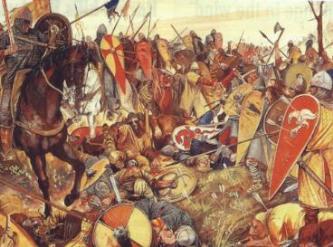The Hundred Years War
The International History Project

The Hundred Years War was an intermittent struggle between England and France in the 14th-15th century over a series of disputes, including the question of the legitimate succession to the French crown. The struggle involved several generations of English and French claimants to the crown and actually occupied a period of more than 100 years. By convention it is said to have started in 1337 and ended in 1453, but there had been periodic fighting over the question of English fiefs in France going back to the 12th century.
Medieval legalities were such that one king could be the vassal of another king if the first had inherited titles outside his own kingdom. Such was the case with the English kings since William I, who, as the duke of Normandy, had conquered England in 1066. Marriage alliances and wars had altered the nature of the English titles in France, but, at the death of the French king Charles IV in 1328, Edward III of England was also duke of Guyenne (part of Aquitaine in southwestern France) and count of Ponthieu (on the English Channel). Furthermore, because his mother was Charles IV's sister and because Charles IV had no sons, Edward III considered himself a legitimate claimant to the French throne. The other major claimant was the Count of Valois, a grandson of Philip III of France through a younger branch of the family.
A French assembly called to settle the question chose the Valois claimant as Philip VI. Edward III appeared to accept the decision, but when Philip VI, afraid of another king's power in his realm, maneuvered to confiscate Guyenne in 1337, Edward III renewed his claim to the French throne and brought an army to Flanders.
Medieval warfare occasionally involved pitched battles that could be decisive. More frequently, however, warfare consisted of long and costly sieges conducted against important fortified cities. Even though the English armies of Edward III kept both Philip VI (d. 1350) and his son John II (reigned 1350-64) on the defensive, progress in expanding the area of English occupation was slow. Edward failed to press the advantage following his major victory at Crécy in 1346 in order to besiege the town of Calais. Edward III's son Edward the Black Prince even managed to capture John II at the crushing victory of Poitiers (1356). This forced the French to try to reach some agreement. The treaties of Calais (1360) gave Edward III full sovereignty over lands that he formerly held as a vassal of Philip VI. However, when John II died in captivity, awaiting fulfillment of all the provisions of the treaties, his son Charles, crowned as Charles V, refused to respect the treaties and reopened the conflict. This time the French put the English on the defensive until Charles V's death in 1380 halted progress in the reduction of English territory.
After 1380 both countries were preoccupied with internal power struggles, and the war lapsed into uncertain peace. Possession of Flanders remained the outstanding issue. Edward III's grandson Richard II was eventually deposed (1399) by another grandson, who became Henry IV. In France, Charles V's brothers fought over who should administer affairs of state in the name of Charles VI, who suffered from bouts of insanity that rendered him incapable of ruling.
One of Charles VI's uncles, Philip the Bold, Duke of Burgundy, died in 1404. His son and heir, John the Fearless, had a rival cousin, Louis, Duke d'Orléans, assassinated in 1407. Civil war broke out in France between the Armagnacs (supporters of Orléans and, later, adherents of the dauphin Charles) and the Burgundians. The English king, Henry V, upon assuming the throne following his father's death in 1413, decided to take advantage of the French discord in order to campaign anew for the English claims on the French crown. When John the Fearless was assassinated in his turn by the Armagnacs, Henry V found an ally in John's son, Philip the Good. By 1422, the Anglo-Burgundian alliance controlled Aquitaine and all France north of the Loire, including Paris.
Then English fortunes changed. Henry V died in 1422 leaving only an infant son. Weeks later the incapacitated Charles VI died, allowing his son to come to the French throne as Charles VII. The war's turning point was reached in 1429, when the English army was forced to raise its siege of Orléans by a relief force organized by Joan of Arc. Although Joan was captured by the Burgundians, sold to the English, and tried and executed for heresy, Philip the Good became convinced that the English could never impose their authority on a region as large as France without more support from the native nobility. He therefore switched sides in 1435, and Paris once again came under the authority of the king of France. Charles VII conquered Normandy and, taking advantage of the internal dynastic struggles connected with the English Wars of the Roses, conquered all of Aquitaine by 1453. England retained only Calais, which it relinquished in 1558.Historians have long considered the Hundred Years' War a milestone in the development of national consciousness in western Europe. The English, after their many successes and frustrations, were finally cured of their taste for continental intervention, and the English monarchs turned increasingly to the problems of internal development. The hard-fought success of the house of Valois in securing the French crown helped insure that France would not become a realm in name only, partitioned among numerous independent princes.

